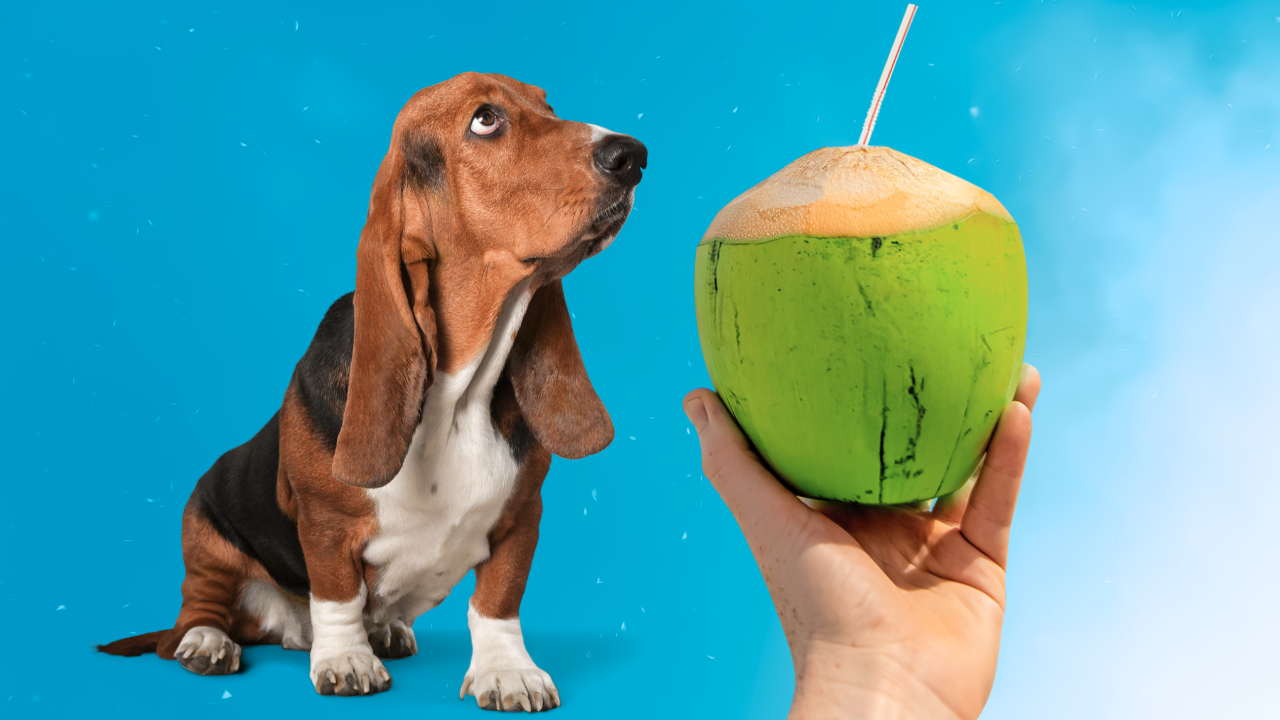Our furry friends are family. We share our lives with them, from lazy Sundays on the couch to exhilarating walks in the park. But can we also share our love for coconut water with them?
A surge of health-conscious consumers has seen coconut water become a household staple for many. Known for its hydrating properties and filled with electrolytes, it's a common ingredient in human diets. But, can dogs safely drink coconut water too?
Is Coconut Water Safe for Dogs?
To answer the pressing question, yes, dogs can safely drink coconut water. It isn't toxic or harmful to dogs in moderate amounts. However, as with most things, moderation is key.
Coconut water contains a high amount of potassium. While this mineral is beneficial for maintaining your dog's heart and kidney health, excessive potassium can be harmful. A balanced diet should provide all the necessary nutrients your dog needs, and supplementation is typically not required unless recommended by a vet.
Remember, too, that coconut water should never replace fresh, clean water as the primary hydration source for your dog. While coconut water can be a refreshing treat, nothing beats a good old bowl of water when it comes to quenching your dog's thirst.

Potential Benefits of Coconut Water for Dogs
Let's dive a little deeper. If dogs can safely drink coconut water, what benefits could they get from it?
Coconut water is a natural source of electrolytes, which can aid in hydration. This can be particularly beneficial after a vigorous session of exercise or a long hike on a hot day. It may help replenish the lost electrolytes and keep your dog hydrated.
Moreover, coconut water can aid digestion. The high fiber content in coconut water can support your dog's gut health. So, if your dog has digestive problems, a small amount of coconut water could potentially help.
Risks of Coconut Water for Dogs
However, there are risks to consider. Despite the potential benefits, coconut water may not be suitable for all dogs.
Dogs with kidney issues should avoid coconut water due to its high potassium content. Furthermore, coconut water contains sugars. Although natural, these sugars can contribute to weight gain and dental problems in dogs, especially if they consume coconut water frequently.
Therefore, it's always wise to consult with a vet before introducing new elements into your dog's diet, including coconut water. The vet can provide a comprehensive view of your dog's health and determine whether coconut water is a suitable addition.
Incorporating Coconut Water Into Your Dog's Diet
If your vet gives the green light, you might wonder how to incorporate coconut water into your dog's diet. Here are a few tips.
First, introduce coconut water slowly and in small amounts. Dogs have sensitive stomachs, and introducing new foods abruptly can lead to digestive upset. Start with a small serving, like a tablespoon, and monitor your dog's reaction.
Next, consider the temperature. Just like humans, some dogs may prefer their coconut water chilled, especially on a hot day.
Lastly, you can try adding a splash of coconut water to your dog's food for a tropical twist. However, remember to always prioritize a balanced diet with high-quality dog food and plenty of fresh water.
Real-Life Example: Coco the Coconut-Loving Dog
Meet Coco, a labrador retriever with a quirky love for coconuts. Her owner, Sarah, discovered Coco's love for coconuts during a vacation in Hawaii. Coco would fetch coconuts from the beach, break them open, and lap up the coconut water.
On returning home, Sarah began incorporating coconut water into Coco's diet, especially after long hikes. Coco, known for her bouts of flea infestations, showed a decrease in itching and discomfort. Sarah swears by coconut water as a natural therapy for Coco's skin and digestive health.
However, Sarah emphasizes the importance of moderation and veterinary guidance. Although Coco enjoys her coconut water treat, it does not replace her regular diet or her bowls of fresh water.
Coconut Water Versus Regular Water for Dogs
Let's tackle another angle of the coconut water debate: how does it compare to regular water for dogs?
As we've mentioned earlier, regular water should always be the primary source of hydration for dogs. Coconut water, while refreshing and beneficial in moderation, cannot replace the essential role water plays.
Why is that? Firstly, water does not contain any sugars. This makes it a healthier, calorie-free hydration source. Plus, it’s readily available and most dogs are accustomed to drinking it.

Dosage of Coconut Water for Dogs
If your vet has approved and you decide to give coconut water to your pooch, remember to do so in moderation. Large quantities are not necessary and may even lead to health problems.
As a general guide, you might start with a tablespoon of coconut water mixed into your dog's regular water bowl or food. If your dog weighs more, you may gradually increase the amount, but it's always best to consult your vet for personalized guidance.
The Popularity of Coconut Products for Dogs
The pet industry has seen an influx of coconut-based products in recent years. From coconut-infused dog food and treats to shampoos and skin care products, the popularity of coconut is apparent.
Coconut oil, in particular, has been lauded for its potential benefits for dogs. Some owners use it topically to soothe skin irritations caused by fleas or dry skin, while others incorporate it into their dog's diet for its potential digestive and immune-boosting benefits.
However, as with coconut water, coconut oil should be used in moderation and under the guidance of a vet. Excessive amounts can lead to weight gain and other health issues.
Exercise and Hydration for Dogs: The Coconut Water Factor
It's a beautiful Saturday morning, the sun is shining, and you're preparing for a long hike with your beloved furry companion. You're packing up essentials – the leash, some snacks, and water for both of you. And then you wonder, should you pack some coconut water for your dog, too?
While regular water should be your go-to, coconut water can serve as an occasional treat after a strenuous exercise session. It can help replenish the electrolytes lost during the exercise. But remember, coconut water should never replace regular water or a balanced diet.
If you do decide to give your dog coconut water during your hiking trips, ensure it's given in moderation. Just like us, dogs can feel the effects of overhydration. Symptoms can include nausea, lethargy, or in severe cases, it could lead to life-threatening conditions like water intoxication.

Coconut Water: A Potential Ally Against Fleas?
If your furry friend has ever had a flea problem, you know how frustrating it can be. Not only for you but especially for your dog, who may experience discomfort, itching, and even potential allergies to flea bites.
While there's no scientific evidence to support the idea that coconut water can help combat fleas, some anecdotal reports suggest that coconut oil, a derivative product, may assist. The theory is that the lauric acid present in coconut oil can act as a natural flea repellent when applied topically.
It's essential, however, to remember that effective flea prevention and treatment typically require more comprehensive approaches. This can include regular flea treatments, maintaining a clean environment, and regular check-ups with your vet.
Coconut Water as a Treat, Not a Necessity
As we draw to a close, it's crucial to remember that coconut water should be viewed as a treat for dogs, not a necessity. Your dog's primary source of hydration should always be clean, fresh water. Their diet should be balanced, filled with high-quality dog food that meets their nutritional needs.
Coconut water can serve as a fun, occasional treat for your dog. However, it's not suitable for all dogs, and some may have health conditions that can be exacerbated by the high potassium content. Always consult with your vet before introducing new elements into your dog's diet, including coconut water.
Enjoying the Simple Pleasures with Your Dog
Being a dog owner isn't just about taking care of your pet's health, it's about enjoying the simple pleasures in life with them. That could be a game of fetch in the park, a cuddle on a rainy day, or sharing a sip of coconut water on a hot summer day.
Remember, every dog is unique, and what works for one might not work for another. So, whether your dog ends up enjoying coconut water or not, the most important thing is to make informed, healthy decisions that contribute to their well-being.
In the end, seeing that wagging tail and the look of pure joy on your dog's face is all that matters. As a responsible pet owner, you have the power to ensure your furry friend lives a happy, healthy, and hydrated life, whether that includes coconut water or not.
Enhancing Your Dog's Health and Safety with FI Dog Collars
As responsible dog owners, we prioritize our dogs' health and safety above all else. While maintaining a balanced diet and proper hydration are key, advancements in technology have presented us with tools that can further ensure our furry friends' well-being. One such tool is the Fi Dog Collar.
A Fi Dog Collar is more than just an accessory for your pet. It's a state-of-the-art GPS tracking device, activity monitor, and so much more. But how does this fit into the picture of our topic - coconut water for dogs?
Monitoring Hydration and Exercise with FI Dog Collars
When discussing hydration, which we've extensively covered with our coconut water topic, it's impossible not to consider exercise. After a long hike or rigorous play session, your dog might benefit from a refreshing sip of coconut water to replenish lost electrolytes.
This is where a Fi Dog Collar comes in handy. The collar tracks your dog's activity levels throughout the day. Whether you're out on your favorite hiking trail or playing fetch in the park, the collar provides valuable insights into your dog's exercise habits. By understanding these habits, you can adjust hydration needs accordingly.
Perhaps after a particularly strenuous day, you might decide to offer your dog a bit of coconut water, of course, with your vet's approval.
Safety First: FI Collars and Coconut Water
Remember Coco, the coconut-loving labrador we mentioned earlier? Well, imagine she sneaked out one day, lured by the scent of coconuts. With a Fi Dog Collar, Sarah, her owner, could easily track Coco's whereabouts and ensure she doesn't overindulge in coconut water, which, as we've learned, could lead to health problems when consumed in excess.
The Fi Dog Collar's GPS tracking capabilities provide an extra layer of security for adventurous dogs like Coco. As we've discussed, while coconut water can be a nice treat, it should be given in moderation. The Fi Dog Collar allows you to keep a close eye on your pet's whereabouts, ensuring they're safe and not sneaking off for an unsupervised coconut feast.
Conclusion:
In conclusion, as responsible dog owners, our primary focus is on the health and well-being of our furry companions. Coconut water can be a refreshing treat for dogs, offering hydration and potential digestive benefits, but should be given in moderation due to its sugar content. Always consult a vet before introducing it into your pet's diet.
Remember that your dog's main source of hydration should always be regular water, especially during exercise and activities like hiking. In this digital age, tools like the Fi Dog Collar can help track your dog's activity levels and ensure their safety.
Balancing diet, hydration, exercise, and safety, using both natural elements like coconut water and technology like Fi collars, contributes to a wholesome approach to dog care, fostering a happy and healthy life for our beloved pets.